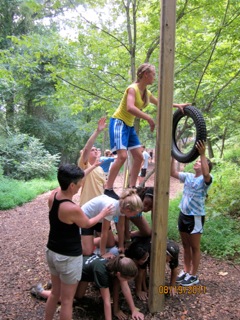 As the old saying goes, practice makes perfect. This is just as true in the office as it is on the basketball court, football field, soccer pitch, or hockey rink. No one is born perfect and no team is formed perfect. It all takes work. Whether your employees need help learning to open up and communicate freely or they just need to learn how to trust one another, Team Building can help.
As the old saying goes, practice makes perfect. This is just as true in the office as it is on the basketball court, football field, soccer pitch, or hockey rink. No one is born perfect and no team is formed perfect. It all takes work. Whether your employees need help learning to open up and communicate freely or they just need to learn how to trust one another, Team Building can help.
According to Diazgranados et al., a “meta-analysis of data from 103 studies [conducted between 1950 and 2007] provides the strongest scientific evidence to date that team building can have measurable, positive effects on team performance.” However, without practice, the lessons learned during one afternoon of team building will be quickly lost. “Team building, without some follow-up mechanism, is often a waste of time and energy,” says researchers William J. Rothwell, Roland Sullivan, and Gary N. McLean – which is why researcher John N. Peragine claims, “Follow-up is the most important step in any team building exercise.”
Just like in sports, one practice is not enough to enact lasting change. Even the great Michael Jordan works tirelessly to perfect his game.
“Some people want it to happen, some wish it would happen, others make it happen.”
– Michael Jordan
Team build too takes practice. Researcher R. Wayne Boss writes that “When team building is coupled with follow-up sessions in which team building commitments are reinforced and renewed, the positive effects of the team building are prolonged.” Boss collected personal interview data from 208 participants (135 experimental and 71 comparison group members), and found that regular Personal Management Interviews (PMIs) can prevent the regression or fade-out which often occurs after a single team building session. These follow-up sessions are proven to “help to sustain high performance,” adds researchers William G. Dyer, W. Gibb Dyer, and Jeffrey H. Dyer.
“Talent wins games, but teamwork and intelligence wins championships.”
– Michael Jordan
“There is a relationship between the follow-up actions taken and perception of team building success,” writes researchers H.S. Kriek and P. Venter. As researchers William J. Rothwell, Roland Sullivan, and Gary N. McLean explain, “Much of the research on team building suggests that teams that do a one-time team building session but fail to create any follow-up activities to reinforce what they’ve learned quickly regress to their previous behaviors.” This is why Terrapin Adventures recommends a follow-up session every three to six months. Our Team Building Programs can elevate your organization and make you shine.
These follow-up sessions are also an excellent opportunity to expand up those previous lessons and take your team to the next level. It takes time to enact positive, long-lasting change. “Team developmental interventions are key mechanisms that may be used to facilitate team effectiveness,” writes Raymond Noe in Employee Training and Development.
Terrapin Adventures creates customized programs (onsite or offsite, indoor or outdoor) designed specifically for each client. Our programs provide for exciting activities that bridge the gaps in communication, improve collaboration, and expand your group’s problem solving skills.
Schedule Your Corporate Team Building Session!
If you have any questions, please call Terrapin Adventure at 301.725.1313, or email us at info@terrapinadventures.com to learn more.
Works Cited:
- Boss, R. W. “Team Building and the Problem of Regression: The Personal Management Interview as an Intervention.” The Journal of Applied Behavioral Science 19.1 (1983): 67-83. Web.
- Dyer, William G., W. Gibb Dyer, and Jeffrey H. Dyer. Team Building: Proven Strategies for Improving Team Performance. San Francisco: Jossey-Bass, 2007. Print.
- “Team Building Works: Results of 103 Studies.” VictorsFood. N.p., 2013. Web. 30 June 2016.
- Kriek, H. S., and P. Venter. “The Perceived Success of Teambuilding Interventions in South African Organisations.” Southern African Business Review 13.1 (2009).
- Rothwell, William J., Roland Sullivan, and Gary N. McLean. Practicing Organization Development: A Guide for Consultants. Amsterdam: Pfeiffer., 1995. Print.
- Peragine, John N. 365 Low or No Cost Workplace Teambuilding Activities: Games and Exercises Designed to Build Trust and Encourage Teamwork among Employees. Ocala, FL: Atlantic Pub. Group, 2007. Print.
- Noe, R. A. (2002). Employee training and development (2nd ed.). Boston: McGraw-Hill.
